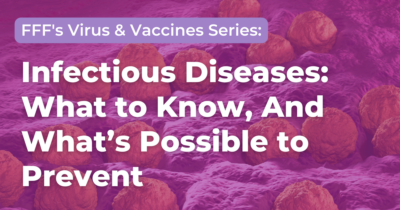- Flu Vaccine Information
Virus and Vaccines: Which Diseases are Preventable

Did you know that there are many preventable infectious diseases thanks to the power of vaccines? In this series, we’ll walk through some of the viruses and vaccines commonly available so you have all information you need to protect yourself, your family, and your community.
Did you know routine vaccinations protect against 14 different diseases? You may not even know some of these diseases exist thanks to these vaccines! The list includes:
Polio
Tetanus
Influenza (Flu)
Hepatitis B
Hepatitis A
Rubella
HIB (Haemophilus Influenzae Type B)
Measles
Pertussis (Whooping Cough)
Pneumococcal Disease
Rotavirus
Mumps
Varicella (Chickenpox)
Diphtheria
In this blog post, we’ll highlight a few illnesses and how routine vaccinations have saved countless lives.
Polio
Polio can be a debilitating and potentially deadly infectious disease caused by poliovirus. According to the CDC, the virus spreads from person to person and can invade an infected person’s brain and spinal cord, causing paralysis. Vaccines have lowered hospitalizations and illnesses in the United States, but we still see it in those that are not protected by vaccination.
Organizations like Voices for Vaccines share that diseases like polio are being seen again. Hear from polio survivors here. One survivor who contracted the disease in 1992 listed the silent symptoms she still faces today. These symptoms include constantly cold feet, chronic fatigue, and urinary/kidney infections. This survivor was not vaccinated against polio and urges everyone with access to vaccines to act as soon as possible and get vaccinated against this preventable disease.
Vaccinating infants and children is one of the best ways to get ahead of the disease and prevent a rise in polio. Doctors recommend that your child get four doses of the polio vaccine (also called IPV). Your child will need one dose at each of the following ages:
1-2 Months
4 Months
12-23 Months
4-6 Years
Measles
Measles starts with a fever that can get very high. Fevers help the body fight infection but can cause harmful side effects like vomiting, seizures and even death. Some of the other symptoms that may occur are:
Cough, Runny Nose, and Red Eyes
Rash of Tiny, Red Spots that Start at the Head and Spread to the Rest of the Body
Diarrhea
Ear Infection
Measles can be dangerous, especially for babies and young children. In some cases, measles can lead to Pneumonia, lifelong brain damage, hearing loss and death. Measles spreads when a person infected with the measles virus breathes, coughs, or sneezes and it is very contagious. The good news? Measles is a disease that is preventable with the MMR vaccine.
When should your child get the MMR vaccine? Doctors recommend that children get the first dose at 12-15 months and the second dose at 4-6 years. The MMR vaccine not only protects children from measles, a potentially serious disease, as well as mumps and rubella, but it also protects children from getting an uncomfortable rash and high fever from measles.
Flu
How does the flu start? What are the warning signs? Flu virus usually begins as an infectin in the nose, upper airways, throat or lungs. Flu spreads quickly and can cause serious illness, sometimes resulting in hospitalization. These symptoms can be especially dangerous for young children, older people, pregnant women and people with chronic health conditions like asthma or diabetes. The flu vaccination is the number one way to protect yourself and your loved ones.
According to the CDC, flu viruses are constantly changing, so new vaccines are made each year to protect against the flu virus variants that are likely to cause the most illness during the upcoming flu season. Over time, protection provided by the flu vaccine wears off, making it extremely important to get vaccinated each year. Flu vaccines are accessible to nearly everyone via local healthcare providers and pharmacies. Flu vaccines are recommended for everyone 6 months and older.
Stay Informed
Vaccine researchers are continuing to develop new vaccines to help prevent serious illness that can cause hospitalization and death, like Respiratory Syncytial Virus (RSV). With more vaccine misinformation around these days, it’s important to stay informed. Understanding how to stop the spread of these infectious diseases and keep our communities healthy can be life-saving. We hope this information and these resources will help you make informed decisions about vaccinations in the future. Preventing the spread of infectious diseases and keeping people healthy is our top priority and we hope it is one of yours as well.
Not sure where to start? Check out this immunization schedule to help you with next steps and schedule an appointment with a healthcare provider to make a vaccine plan for you and your family today.

